ECU Health emergency medicine residents took time away from their regular Wednesday morning classroom sessions and dove into an Emergency Medicine Wilderness Day exercise at Wildwood Park in Greenville.
On May 29, about 20 emergency medicine residents spent their morning in small groups, walking around the park and encountering “patients” with different ailments. From poisoning to animal attacks and drowning scenarios to firework accidents, the experience helped residents prepare for real-world scenarios and eventual board exams. Residents received real-time instruction and feedback from the Brody School of Medicine at East Carolina University faculty as they worked through their training.
The patients for this exercise were standardized patients from Brody’s Office of Clinical Skills Assessment and Education. Standardized patients are trained to mimic real patients so that students can learn. Their role is to help prepare future health care professionals for a variety of patient interfaces.

Dr. Sarah Thead is a second-year emergency medicine resident at ECU Health and said she’s attended the training the last two years and has benefited from the experience.
“It’s a great educational experience every time we do this,” Dr. Thead said. “It’s scenario-based and our faculty try to set up the scenarios similar to how they’ll be set up on our oral board exams, so it’s a fun experience but also really important from an educational perspective as well.”
She said the scenarios change from year to year which helps her and her co-residents as they try to work together and think quickly to help patients experiencing a medical emergency.
Dr. Jennifer M. Bennett, an emergency medicine physician at ECU Health, clinical assistant professor of emergency medicine and medical director of the Simulation Center at Brody, said this kind of exercise is important for a number of reasons.
“It’s a great opportunity to demonstrate how we can all work together, even outside of the emergency department. It’s important to work on these skills in a different environment,” Dr. Bennett said. “It’s also a good opportunity to have some team bonding for the residents. Just getting them out for a day and letting them do something a little bit different, getting them out in the sun, that’s a positive as well.”
Dr. Bennett said having Wildwood Park available to run this exercise has helped this program thrive over the last three years.
Along with Dr. Bennett, Dr. Jennifer Parker-Cote, assistant professor of emergency medicine at Brody, helped to create the simulation and organize the event.
In Dr. Parker-Cote’s simulation, residents had to assess a camper who had ingested a toxic mushroom in the woods. Residents assessed the standardized patient, asked about the patient’s medical history and made recommendations on next steps for care.
“These scenarios allow residents to apply the knowledge they’ve gained through their residency and apply it to real world situations and permits them to improvise in wilderness medicine, which you have to do a lot of times,” Dr. Parker-Cote said. “It’s important to put them through these simulations and have them think critically while working together and trying to move quickly to help our standardized patients.”
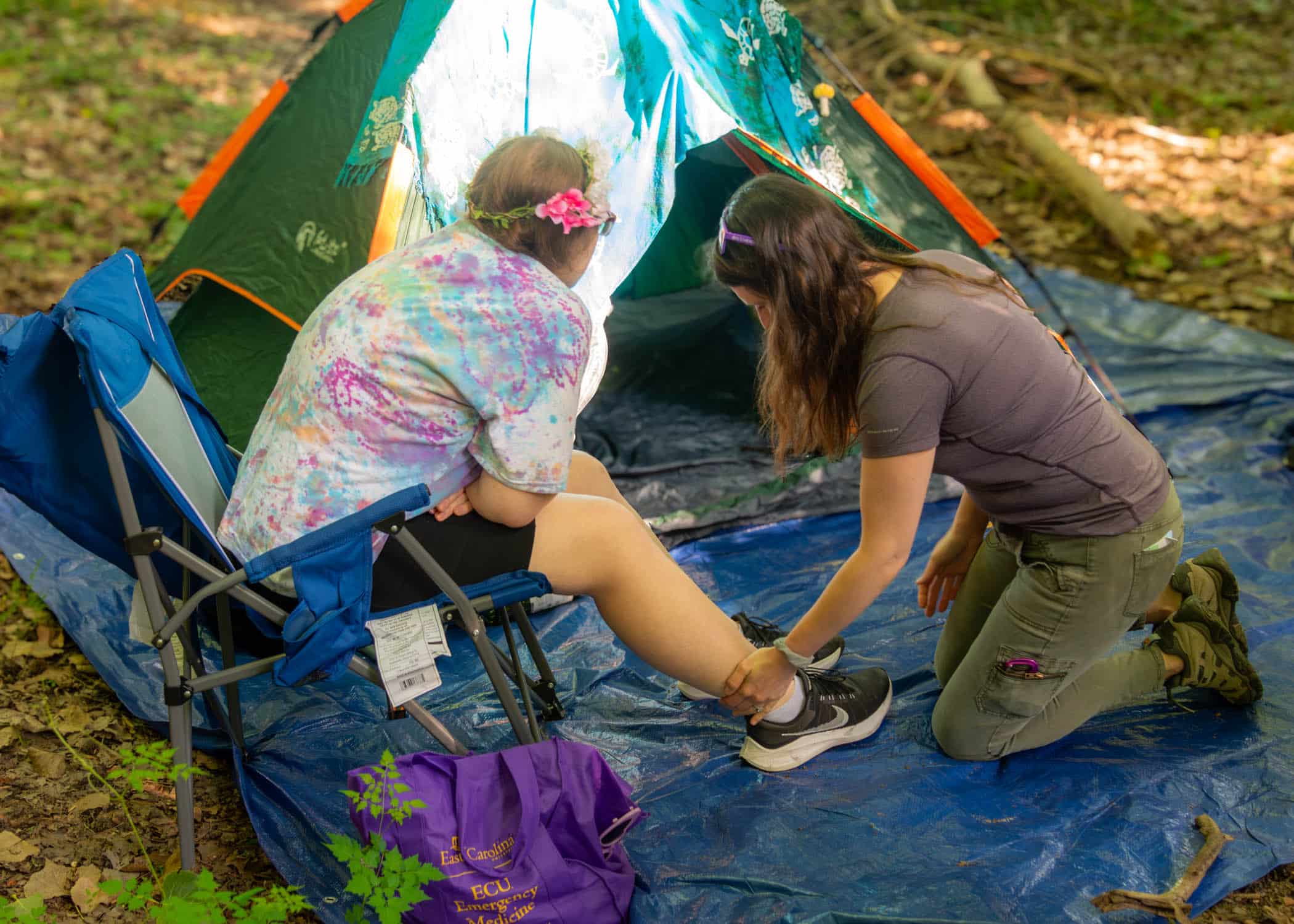
The training is another example of the valued partnership between ECU Health and Brody. Residents at an academic health system like ECU Health have support and resources for continued education from faculty and the Interprofessional Clinical Simulation Program at Brody, enriching their clinical training experience. Residents participate in trainings like this to prepare for real situations with real patients both behind the walls of the hospital and out in the community.
Resources
Updated June 19, 2024
A beam adorned with signatures from ECU Health team members, behavioral health care teams, leadership and the Thomas Construction team was raised into place at the site of the upcoming behavioral health hospital in Greenville.
The beam raising served as a backdrop for an event showcasing the construction progress of the new 144-bed behavioral health hospital, a partnership between ECU Health and Acadia Healthcare, slated to open in summer 2025. ECU Health and Thomas Construction team members paused their important work to witness the historic milestone.
Glenn Simpson, service line administrator for behavioral health at ECU Health, said this event was another historic step, celebrating about 15 years of work to bring a behavioral health hospital into the ECU Health system to serve eastern North Carolina.

“Today is only the beginning of so much excitement around this facility,” Simpson said. “We couldn’t be more excited to be partnered with Acadia Healthcare and working with Thomas Construction to build this facility. This is all allowing us to offer outpatient services, specialty services that we cannot provide today and we’ll be able to treat a population of children and adolescents who used to have to drive over 70 miles for inpatient treatment.”
Mary Branch-Ellis, a registered nurse with the behavioral health team at ECU Health Medical Center, has been with the system for 41 years. She said she was working at the former Pitt County Memorial Hospital years ago when the behavioral health unit first opened in the 1980s.
She said seeing the facility come together is something she will never forget and she’s glad eastern North Carolinians in need of the services will have everything under one roof.
“It’s just wonderful to be a part of this as someone who is invested in this work in eastern North Carolina,” Branch-Ellis said. “I’ve worked so many years in mental health and been an advocate for patients and now we’re seeing this state-of-the-art facility being built and it’s a wonderful experience to see these beds – which we need – opening up. I’m excited to see it coming to Greenville and I’m proud to be a part of it.”
ECU Health team members sign beam slated for upcoming behavioral health hospital
Recently, ECU Health team members had the opportunity to leave their mark on the upcoming state-of-the-art, 144-bed behavioral health hospital in Greenville, slated to open in 2025.
The Thomas Construction team brought a beam, which is slated to be installed in the hospital’s gymnasium, to ECU Health Medical Center for team members to sign. More than 100 team members signed the beam and many signatures will be visible in the gymnasium even after construction is complete.
Amy Albritton, a recreational therapy assistant in Behavioral Health Services, has been with the system for more than 25 years. She said it’s special for her to see the plans for the new hospital come together after her years on the unit.
“I think being able to see the beam and sign it helps make it a little more real,” Albritton said. “It’s been talked about for a while now but having this here that we can touch, it’s a really exciting time. I’m just glad to be a part of it.”

Glenn Simpson, service line administrator for behavioral health at ECU Health, said engaging team members in the lead up to the hospital opening is a great opportunity for education and building excitement.
“With building a brand-new hospital, it’s special to give our team members the opportunity to be part of the history of that by signing one of the beams,” Simpson said. “When they’re finished with the gymnasium part of the structure, they’ll be hoisting the beam into the framework. This is great for team members to sign the beam and know that their name will forever be a part of that hospital.”
Renderings of the upcoming hospital were also on display during the beam signing to allow team members to see the plans again. The beam was in the hospital for about a week before being returned to the construction site.
To learn more about new behavioral health hospital, please visit: ENCBehavioralHealth.org
Resources
Health care providers of East Carolina University’s Healthier Lives initiative in the Brody School of Medicine continue to use the program to address health care needs for children in rural eastern North Carolina counties and are finding pathways to expand access to care at schools in Duplin County and beyond.
The Healthier Lives at School & Beyond Telemedicine Program originally launched in 2018 to deliver interdisciplinary services virtually to rural school children, staff and faculty during the school day. In response to COVID-19, the program continued to address health care needs for children and expanded access while students were learning remotely.
Since the fall of 2020, the program has used an ECU Transit bus to visit schools in Duplin, Jones and Sampson (Clinton City Schools) counties to provide high-quality health appointments. The retrofitted motorcoach has been used to provide screenings for 303 students, with additional visits planned for existing program partnerships and newly established ones.
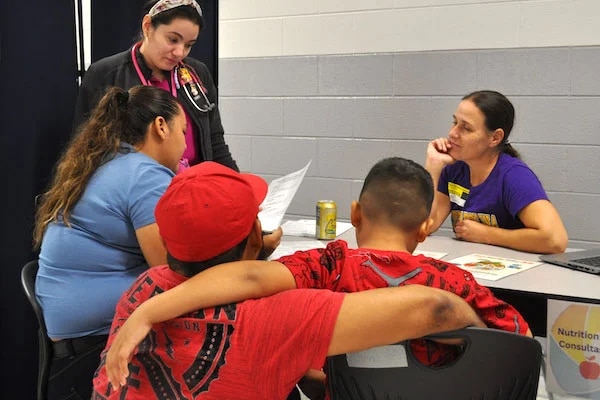
The initiative was recognized recently by the Mid-Atlantic Telehealth Resource Center with the Breaking Barriers Through Telehealth Award in the category for small, rural and safety net organizations. During the 2024 Rural Health Symposium, a presentation on Healthier Lives – On the Road Again: Rolling to Reduce School Suspension – was awarded first place in innovations panel.
Experiential learning
Delivering care in the community is also delivering learning opportunities for ECU students. Third- and fourth-year medical students and medical residents participate in clinic days, gaining hands-on experience providing health care to rural populations.
Recent Brody graduate Dr. Melenis Lopez said the Healthier Lives clinics demonstrate that service is truly ECU’s mission. During a school clinic in the fall, Lopez applied pediatric learning experience as a care provider. She collected patient history and assisted in making plans for children that could be passed on to the school.
“Providing care in a place that is convenient to the community can be lifesaving,” Lopez said. “Offering physicals can uncover developmental delays and health problems. Children can’t stay in school without these physicals and proof of vaccinations, so I’m happy we were able to be there for the kids.”
Lopez and her ECU cohort guided elementary students and their families through clinic stations to take vitals, check vision and hearing, and perform physical exams. Students could meet with mental health and nutritional professionals for additional screening when needed.
Lopez used her ability to speak Spanish to help the children feel comfortable and ease the burden on families who may not understand the forms or instructions from the care provider.
Rural health care
Dr. Krissy Simeonsson, associate professor for pediatrics and public health and the medical director for the program, is proud that Healthier Lives is giving ECU students the opportunity to experience health care in a rural setting.
“Students can see that they can help,” Simeonsson said. “Most students and residents we’ve had have that ‘aha’ moment and can see themselves in primary care. They realize they can succeed out here.”
Jill Jennings, ECU’s Healthier Lives program manager, said the hybrid approach of on-site clinics and telehealth makes it easier for the medical providers to communicate with parents in person and more readily make referrals for any nutrition or behavioral health follow-up virtual care.
A $1.2 million grant from the Health Resources and Services Administration funded the first four years of the program. Funding now comes primarily from Anonymous Trust, a private North Carolina foundation, and has been provided by the Harold H. Bate Foundation, the ECU Health Foundation, and the North Carolina Department of Health and Human Services Office of Rural Health.
“There are many opportunities for institutions such as ECU to leverage their resources to address community needs,” said Debbie Aiken, executive director of Anonymous Trust. “This initiative is a wonderful example of ECU recognizing health care disparities, and in partnership with a local school district, serving children who might otherwise not receive the care that they deserve.”
Aiken witnessed a program clinic in action at Rose Hill-Magnolia Elementary School in Duplin County. ECU medical students and residents, health sciences undergraduate and graduate students, Healthier Lives team members and partners from the school system and Duplin Health Department screened 47 students who otherwise would have been suspended for not having a health assessment completed by a medical provider.
“These partnerships should be happening across the state,” Aiken said. “Seeing it helps you truly understand the disparities in our rural communities. If more school systems understood that this is available, they would want to participate.”
Community engagement
Dr. Jenelle Brison ’24 said Healthier Lives provided an opportunity for community engagement for medical students. Brison encouraged fellow Brody students to participate.
“It’s so nice to interact with the little kids,” Brison said. “Events like this help break down barriers and offer unique training for students.”
While Brison ultimately hopes to focus on obstetrics and women’s health, she was at ease helping children with vision screenings and demonstrating a blood pressure cuff before taking vitals.
Dr. Bolu Aluko ’24, a Tiana Nicole Williams Scholar at Brody, was drawn to the opportunity for community engagement provided by Healthier Lives.
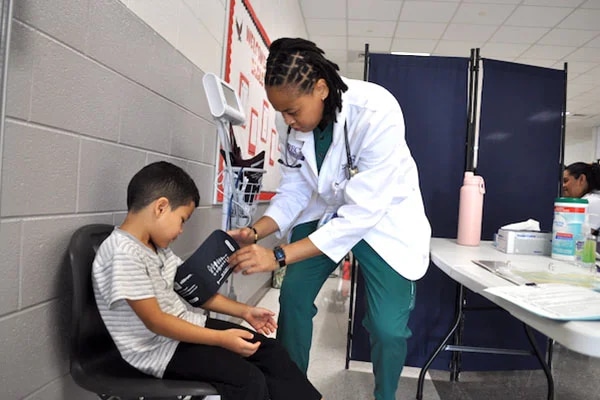
“Coming into the community is incredibly enriching,” Bolu said. “Every med student should do this. It’s a fantastic way to serve and practice our clinical training.”
Through an interpreter, the family of one student said they had received a call from the school that their son would not be able to return to class because he had not had a physical or proof of vaccinations. They had just moved from Mexico to Warsaw, North Carolina. Without the availability of a Healthier Lives clinic at the school, they would not have had access to a health screening for their son in time to meet the state-mandated deadline.
The family sat with an interpreter and was provided a nutritional referral and a connection to a primary care clinic in Warsaw to establish a medical home. “We’re grateful to know he’s healthy,” his mother said through the interpreter.
“You have to meet people where they are,” Simeonsson said. “A lot of families trust the school. When you see the families getting help for their children, you know the program is living up to expectations.”
GREENVILLE, N.C. – The Children’s Miracle Network (CMN) Celebration Broadcast honors past telethon traditions by celebrating selected miracle stories of children who represent the thousands of children in eastern North Carolina who have received treatment at James and Connie Maynard Children’s Hospital at ECU Health Medical Center this past year. This year, the CMN Celebration Broadcast will be held on Saturday, June 1, from 7-8 p.m. and Sunday, June 2, from 6-9 a.m. and 7-11 p.m. airing on longtime partner, WITN. Examples of how CMN donations are used will be featured throughout the event as well to show the impact philanthropic gifts truly make.
“We are so grateful to all those who support our Children’s Miracle Network Hospitals program all throughout the year,” said Elise Ironmonger, director of programs, ECU Health Foundation. “The generosity of our donors enables Maynard Children’s Hospital, located in Greenville and serving 29 counties, to provide life-saving care to the thousands of children who are treated each year. We look forward to being able to showcase the amazing care provided every day at Maynard Children’s Hospital during this weekend’s telethon and to have an opportunity to thank our amazing donors.”
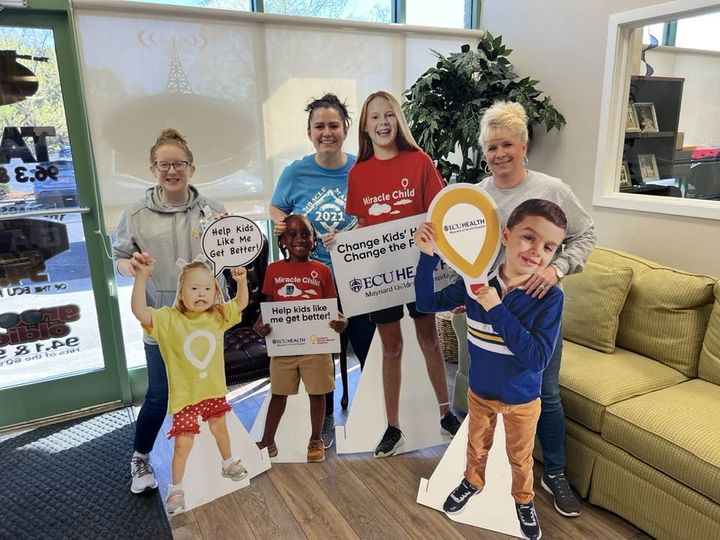
This year’s Miracle Children and Teen include:
- Jadon Green, 1 year old, Greene County
- Leonardo Velasquez-Bartolon, 2 years old, Wayne County
- Layah Collins, 6 years old, Jones County
- Wiley Sloan, 14 years old, Wake County
The 2024 broadcast will highlight examples of the amazing care offered every day at Maynard Children’s Hospital while celebrating the miracles made possible by the life-saving care generous donations help provide. Thanks to the generosity of eastern North Carolina, thousands of children receive the specialized medical care they need, bringing them and their families the gift of hope and healing. Because of this support, the team at Maynard Children’s Hospital can ensure patients receive the best care possible.
The local Children’s Miracle Network Hospitals fundraising program is staffed and supported by the ECU Health Foundation, the non-profit charitable corporation that serves as the custodian for all financial gifts and bequests to ECU Health. The ECU Health Foundation oversees allocation of all donated funds. To donate, please call 1-800-673-5437 or visit givetocmn.com.
ECU Health welcomed more than 50 exhibitors and 100 guests to the 12th annual Mental Health Expo designed to connect community members with important resources on mental health and substance use.
The expo, held at Eastern AHEC in Greenville, was a free event for individuals, family members, caregivers and providers. Three featured presentations from experts covered various mental health and addiction topics.
Duania Roberts with the behavioral health team at ECU Health Medical Center gave a presentation titled “Balanced Being” which tackled stress reduction techniques. James Lally, a certified holistic Registered Nurse at ECU Health Medical Center, spoke on understanding the nervous system to better understand yourself.

Dr. David Ryan, an obstetrician-gynecologist with ECU Health as well as a clinical assistant professor of Addiction Medicine at Brody School of Medicine at East Carolina University, presented on “Turning the Tides of Addiction.” There, he spoke on reducing stigma around addiction and understanding it as a disease. He said it’s also crucial to be familiar with and break down stigmas associated with life-saving medications for addiction treatment.
He said events like the Mental Health Expo help communities understand what is happening around them when it comes to mental health and substance use.
“There has been a lot of shame and a lot of discomfort talking about mental health,” Dr. Ryan said. “I think the fact that we’re able to have these conversations at an event like this helps us reduce the stigma and bring these issues to the surface.”
Glenn Simpson, service line administrator for behavioral health at ECU Health said getting exhibitors to come together in one place for the event is vital for the community to take in all the resources available to them in eastern North Carolina.
“This is really what we need – what this community needs,” Simpson said. “We have providers here. We have Trillium Health Resources, which manages Medicaid and does so much to provide resources to this region. We have the 988 Helpline team here. If someone needs some help with behavioral health and they don’t know who to call, just pick up the phone or text 9-8-8.”
He also said it was an exciting opportunity to share information about the upcoming state-of-the-art, 144-bed behavioral health hospital in Greenville, slated to open in 2025.
Lillie Malpass, executive director of the Pitt County Coalition on Substance Use, participated with her organization in the event and said it was a great opportunity to connect with more community members and other organizations.
“Even among other organizations, we’re getting connected with other great organizations and learning what they do and they’re learning about what we do – that’s so important,” Malpass said. “It’s about exchanging information and getting out of our silos – we’re prevention and meeting with recovery organizations, treatment organizations – it’s great to come together and see how we can all work together.”
Resources
When Dr. Shannon Longshore, the medical director of the pediatric trauma program at ECU Health Medical Center, first joined the hospital, the James and Connie Maynard Children’s Hospital at ECU Health Medical Center wasn’t a verified pediatric trauma center. Now, Maynard Children’s Hospital is one of only four Level I Pediatric Trauma Centers in North Carolina and the only one serving the East.
“It is incredibly fulfilling to reflect on the growth we have experienced over the years, to now achieving verification as Level I Pediatric Trauma Center,” Dr. Longshore said. “Our teams across ECU Health have dedicated their work to constantly improving our care over the course of many years. From prevention, to treatment, and being entrusted to provide critical care at the highest level, this verification is a testament to the mission-driven work that defines our hospital and health system.”

The American College of Surgeons’ (ACS) Verification, Review and Consultation (VRC) Program is designed to assist hospitals in the evaluation and improvement of trauma care and provide objective, external review of institutional capability and performance, accomplished by an on-site review of the hospital by a peer review team experienced in the field of trauma care. There are three levels of ACS trauma center verification, with Level I being the highest verification a trauma center can achieve.
Level I Trauma Centers must be capable of providing system leadership and comprehensive trauma care for all injuries and have adequate depth of resources and personnel. These centers play an important role in local trauma system development, regional disaster planning, increasing capacity and advancing trauma care through research.
Recognizing excellence in pediatric trauma care and community outreach
Dr. Longshore herself has been instrumental in Maynard Children’s Hospital’s continued growth as a trauma center through her research and presentations at national conferences and her work with the Eastern Carolina Injury Prevention Program (ECIPP).
The ACS surveyors noted the value of ECIPP, which aims to create a safer environment, change behavior and change policy to improve the quality of life in eastern North Carolina. Sue Anne Pilgreen currently serves as the executive director of the Safe Communities Coalition and the manager of ECIPP, which has been around since 1995. Between 2020 and 2023, ECIPP was awarded more than $1 million in grant funding, which has supported work in areas such as teen driver safety, suicide prevention, firearm safety, and child passenger and bike safety.
“The surveyors were especially impressed with our work around firearm safety and suicide prevention,” said Pilgreen. “We utilize the pediatric trauma registry data, and that is what drives our work.”
Pilgreen was quick to commend ECIPP team’s work in all areas to prevent injuries, and she highlighted that while most trauma programs have one injury prevention person, ECU Health has an entire team. That enables the program to reach out to rural communities and establish new injury prevention processes.
“Even with our incredible injury prevention team, we recognize that injuries will happen,” said Pilgreen. “To have this Level I Trauma Center with the best of the best gives the opportunities for the best outcomes.”
Other specific strengths noted during the pediatric program’s survey included the addition of two pediatric orthopedic surgeons and a pediatric neurosurgeon; outreach clinical simulations in the region; the collaboration among the pediatric orthopedic surgeon, the neurosurgeon and the Pediatric ICU (PICU); and the recent renovation of the PICU to establish a family-friendly place to care for patients. Of note, a large strength also lauded was the academic research and a collaboration with the Brody School of Medicine at East Carolina University’s Department of Pediatrics.
This expansion of the pediatric trauma research footprint was accomplished through more than 10 publications in nationally recognized journals. Both Erika Greene, manager of the pediatric trauma program, and Elizabeth Seawell, manager of the adult trauma program, credited the collaboration with Brody to produce research and get articles accepted to journals.
“That was a big win for us,” Greene said. “We have an academic medical center with the resources and processes in place to care for injured patients, and we’ve done an amazing job to achieve Level I for pediatrics. We have the capabilities to take the best care of those patients to the highest level of the accrediting body.”
Sustained excellence in adult trauma care
The pediatric trauma center’s new Level I verification accompanies the ECU Health Medical Center’s adult trauma center re-verification of Level I, a title they have proudly held for 40 years.
“We were one of the first Level I Trauma Centers in North Carolina, and we were verified by the American College of Surgeons in 2005,” said Seawell. “We are recognized nationally for how we care for patients in a rural area.”
This recent re-verification was made possible in part due to the resources available to the program including neurosurgical, interventional radiology, orthopedic trauma neurology, and vascular resources, operating room capabilities and blood access, as well as a trauma team of 11 surgeons.
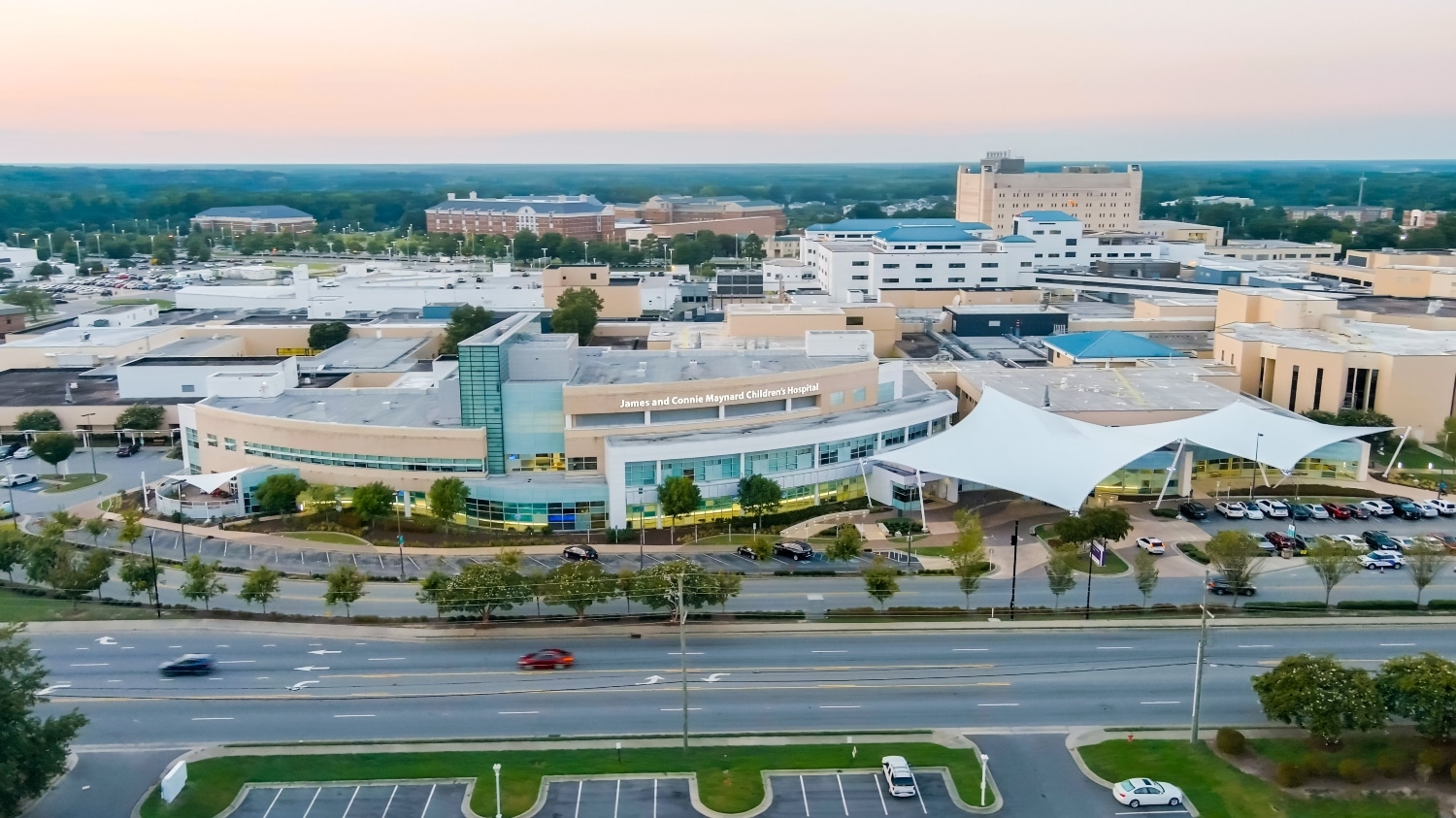
“We are the only Level I Trauma Center for 29 counties, and to reach that far and care for that many patients – we served more than 4,000 patients last year – we have to rely on local community hospitals and emergency response teams to ensure timely transfers and communication,” said Seawell.
Seawell noted that ECU Health Medical Center and Maynard Children’s Hospital have a 60 percent transfer in rate, when the national average is 30 percent, which means they work closely with local EMS agencies, regional transfer facilities, other ECU Health organizations and non-affiliated organizations to serve patients from all over the region.
“The role of our trauma program is to not transfer patients but to have all the resources we need. It provides excellence in patient care and helps keep our patients local,” said Seawell.
Dr. Eric Toschlog, medical director of the adult trauma program, emphasized the tremendous preparation required to achieve Level I. He noted that there are more than 100 standards to prepare for, including paperwork, infrastructure, teamwork and more.
“The visit from ACS is a two-day adventure in stress and anxiety,” Dr. Toschlog said. But at the conclusion, he felt immense pride. “This visit was my seventh in 24 years at ECU Health, and it was clearly our best; we were found to have no deficiencies, and the reviewers used words such as ‘exemplary’ and ‘blown away’ regarding multiple aspects of the trauma center.”
Having two Level I Trauma Centers at ECU Health is no small thing, and both centers achieving the highest level of care is due to the dedication of the trauma center teams.
“I am surrounded by brilliant, compassionate, hardworking, mission-driven individuals who share a singular vision of saving the lives of the patients we have the honor to care for each year. Our success is owed to those truly extraordinary people,” Dr. Toschlog said.
Greenville, N.C. – James and Connie Maynard Children’s Hospital at ECU Health Medical Center received verification from the American College of Surgeons (ACS) Committee on Trauma as a Level I Pediatric Trauma Center, becoming one of only four in the state. Maynard Children’s Hospital now joins ECU Health Medical Center as the only Level I Trauma Centers in eastern North Carolina.
“We are proud of the dedication that all of our team members at Maynard Children’s Hospital have made to prioritizing the delivery of high-quality care close to home, and achieving Level I Trauma Center verification is a demonstration of that commitment,” said Tara Stroud, vice president, Women’s and Children’s Services, Maynard Children’s Hospital. “This verification aligns with our mission to improve the health and well-being of eastern North Carolina by ensuring patients receive prompt and specialized critical care, right here in our region.”

According to the ACS, Level I Trauma Centers must be capable of providing system leadership and comprehensive trauma care for all injuries. In its central role, a Level I Trauma Center must have adequate depth of resources and personnel. Most Level I Trauma Centers are university-based teaching hospitals due to the resources required for patient care, education and research. In addition to providing acute trauma care, these centers have an important role in local trauma system development, regional disaster planning, increasing capacity and advancing trauma care through research.
“Being a Level I Pediatric Trauma Center reaffirms our ability to provide timely, life-saving care for pediatric trauma patients,” said Dr. Shannon Longshore, pediatric trauma surgeon and medical director of the pediatric trauma unit, ECU Health Medical Center. “We see pediatric patients with injuries as the result of falls, motor vehicle collisions, ATV and dirt bike accidents and firearm injuries. The change from Level II to Level I demonstrates Maynard Children’s Hospital’s ability to maintain the highest level of care for patients and advance research publications, national presence as a trauma center and community outreach.”
In Fiscal Year 2023, ECU Health Medical Center cared for a total of 4,057 patients – 3,721 adult and 336 pediatric cases. Nearly 60 percent of patients at ECU Health Medical Center and Maynard Children’s Hospital are transferred in from other hospitals for a higher level of care; the national average is 30 percent.
ACS listed the following as major strengths of the Pediatric Trauma Program: The Eastern Carolina Injury Prevention Program, the outstanding commitment and quality of care provided by the adult trauma/acute care surgeons, availability of whole blood for pediatric trauma patients, three trauma bays, having at least two radiologist in-house 24/7 performing reads and available for consultation, neurosurgical and orthopedic support, disaster management planning and pediatric rehabilitation center.
Maynard Children’s Hospital was previously verified as a Level II Pediatric Trauma Center first in 2017. The verification lasts for three years, until February 2027. ECU Health Medical Center has been a Level I Trauma Center since 2005 and recently received re-verification in 2024.
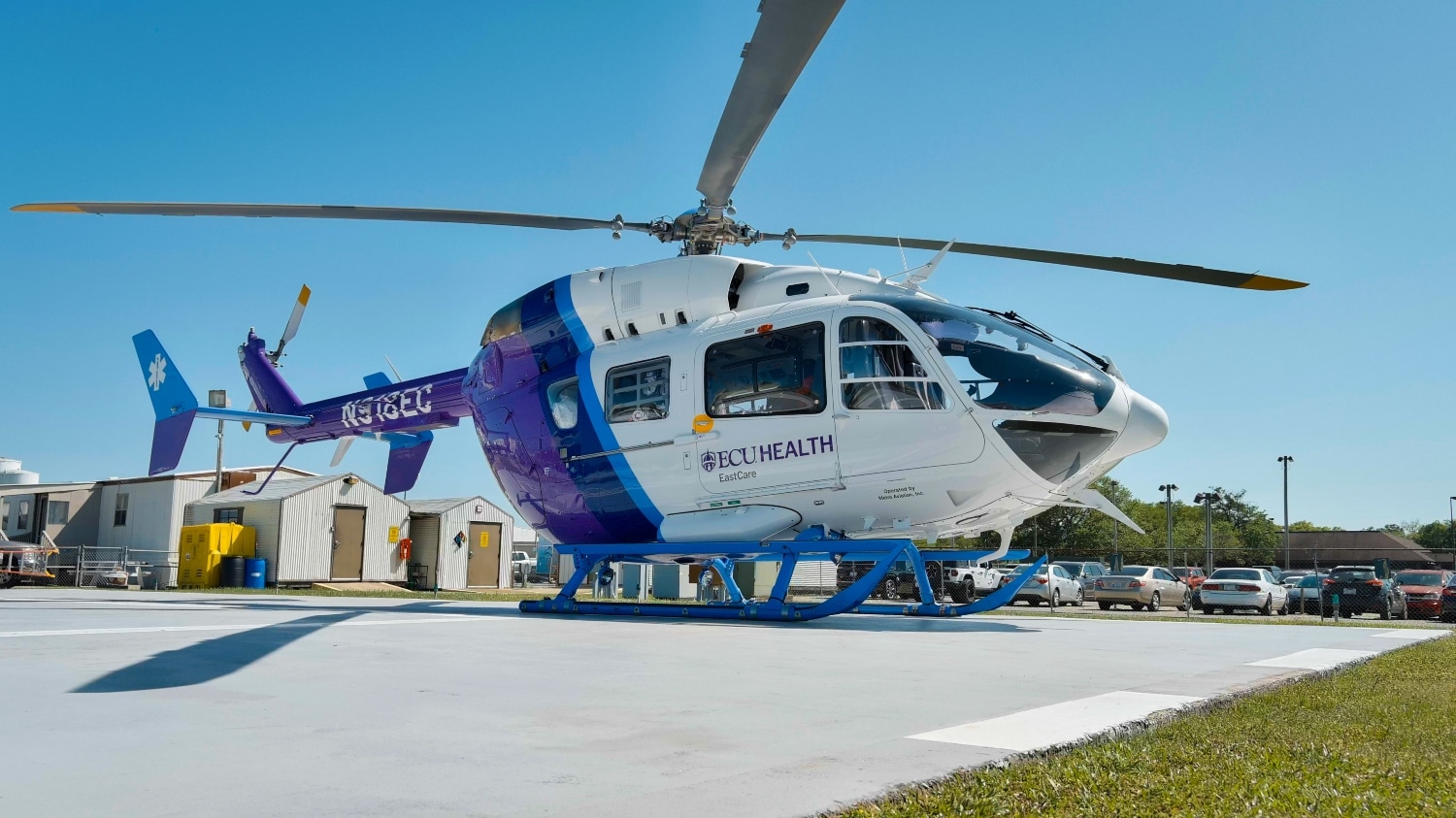
“Maynard Children’s Hospital and ECU Health Medical Center serving as the sole Level I Trauma Centers in eastern North Carolina underscores the value of having a robust system of care with different levels of specialization, ensuring patients receive timely and appropriate treatment for all injuries, from pediatric to adult cases,” said Brian Floyd, chief operating officer, ECU Health. “Maynard Children’s Hospital’s recent verification as a Level I Pediatric Trauma Center reflects ECU Health’s commitment to clinical excellence and academic research, leading to tangible, life-saving benefits for the communities and patients we serve.”
In July 2023, the Eastern North Carolina Nurses Honor Guard had the opportunity to participate in a living tribute for a fellow nurse, Janet Broady Farmer. The group of active and retired LPNs, RNs, FNPs and DNPs typically honors nurses throughout eastern North Carolina by attending their funerals or memorial services, but living tributes are a relatively new service that honors a nurse with a terminal illness or dementia. It allows the nurse to be present at his or her service, and it gives family members the opportunity to share and hear stories about their loved one.
“It is heart-touching for the family,” said Deborah Herring, a retired ECU Health nurse and honor guard member.
The national Nurses Honor Guard was initiated by the Kansas State Nurses Association in 2003. The Eastern North Carolina Nurse’s Honor Guard was established in 2017 by Tabatha Hall, assistant manager of nursing in labor resource management and its current president.
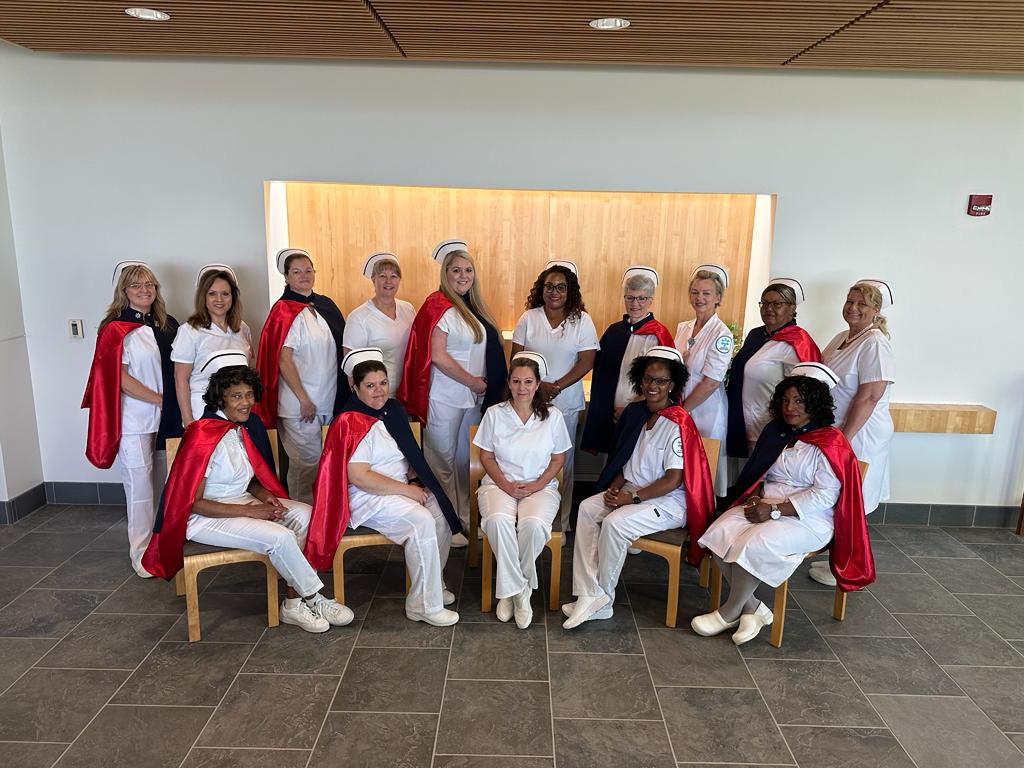
It was the first honor guard established in North Carolina, but many chapters followed. There are now nine regional chapters and one state chapter, and the Eastern North Carolina chapter serves 24 counties in the state.
During the honor guard funeral services, four or five nurses stand guard wearing their traditional white uniforms with caps and navy blue capes. They perform a ceremony customized for the honoree, but which follows a typical format. First, the Nightingale Tribute is performed. At this time, the Nightingale lamp is lit. Then, the Florence Nightingale pledge is recited; this is the same pledge every nurse recites at his or her graduation.
“It means a lot to nurses because they remember when they recited that pledge,” said Herring.
A poem is then read in which the nurse’s name is used, followed by the nurse’s prayer. The ceremony ends with the nurse’s final call to duty, and the Nightingale lamp is extinguished. This service is offered to the family at no cost.
While she’s participated in several funeral services, Herring said last summer’s living tribute was a first.
“The family wanted a little party with refreshments for the service and a table decorated with awards Ms. Janet had won,” she said. “We did our service, and then the family shared their memories of her and invited her former nurse manager to speak about how dedicated of a nurse she had been.”
Herring said the value of this type of service is that the guard can connect more with the family, and the event is a celebration of that person’s life.
It was all the more meaningful, Herring said, because she knew the nurse being honored.
“It just happened that I used to work with Ms. Janet,” she explained. “And this was back a long time ago. I was an African American woman working as a nurse at the Medical Center and I felt like I had to prove myself.” Herring said Janet pulled her aside one day and said something she never forgot: “She said I was smart and didn’t have to prove that to anyone,” Herring recalled. “She inspired me so much, and during the tribute ceremony I told the family that she was the one who inspired me to become a leader. I later became an assistant head nurse at the Medical Center, I worked as the director of nursing at the Pitt County Health Department and I was on the North Carolina Board of Nursing.”
After the ceremony, the honor guard received a thank you letter from Janet’s daughter. In it, she said, “All of our family and friends were so touched by the heartfelt words and sentiment. Having my mother’s previous coworkers there to speak of her passion and worth ethic was so special. Forty years ago, her memory and personality were so vibrant and full of laughter . . . thank you for brining those memories of her back to the forefront.”
Herring said many people don’t realize the honor guard exists or what services they offer.
“We’re trying to make sure people are aware,” she said. “That’s a big challenge.”
The guard members attend nursing conferences and funeral home conventions, they make visits to regional skilled nursing and assisted living facilities and they are working to get their information published in the North Carolina Board of Nursing newsletters. On May 6, the guard will host a booth at the Nurse and Well-Being Fair from 7 a.m. to 3:30 p.m. in the Medical Center’s cafeteria, where more people can learn about the guard and its services. It’s important to honor nurses in this way, Herring said, the same as one in the military, police or fire department might be honored.
“It upholds the profession to know that the service rendered by a nurse is valuable,” she said. “It’s your health being protected by the nurse, and you want to honor them for that.”
With construction underway on the future site of a state-of-the-art, 144-bed behavioral health hospital in Greenville, ECU Health’s Behavioral Health team visited the site for a mental health safety discussion with Thomas Construction.
ECU Health’s service line administrator for Behavioral Health Glenn Simpson visited the construction site during National Safety Week in the construction industry. This year, the focus is on mental health.
Simpson said one in five adults will experience a mental illness, and the construction industry has one of the highest rates of suicide in the nation, where 53 of every 100,000 workers in the United States die by suicide. That rate is four times greater than the national rate.
He said it’s as important to checking in on your own mental health as it is to check in on those around you.

“The construction industry especially has an extremely high rate of suicide. We know that it’s tough work that they’re doing,” Simpson said. “We’re so grateful for Thomas Construction, not only for the work they’re doing here at the site but for inviting us out for this discussion today. The message is important for everyone, but especially for this group here. It’s OK to reach out and ask for help.”
During the event, breakfast, t-shirts and mental health resources were distributed to the Thomas Construction team.
Chris Thorn, a health care team leader for Thomas Construction, helped set up the event. He said between National Safety Week, Mental Health Month and the team building a behavioral health hospital, the opportunity to hear from a professional and share resources worked perfectly.
“It can be a sensitive topic, especially in the construction industry, but ignoring mental health is not an option,” Thorn said. “These conversations are important for us to keep things moving in a more positive direction for our industry and letting our people know they have resources available to them.”
Simpson agreed and said it’s important to normalize conversations around mental health to reduce stigma.
“There’s still so much stigma attached to mental illness and substance use disorders,” Simpson said. “The more we can educate and make people feel OK about talking about those things, the greater impact we’ll have on turning some things around.”
During the event, Simpson promoted the 988 Suicide & Crisis Lifeline as well, which offers 24/7 access to trained crisis counselors who can help people experiencing mental health-related distress.
The lifeline is available nationwide and connects callers with a trained professional in the state from which they are calling. North Carolina residents contacting the 988 services are connected to a team in Greenville. The lifeline offers free and confidential support and can also help callers connect with nearby services.
Resources
ECU Health Behavioral Health Services
ECU Health, Acadia Healthcare host groundbreaking ceremony for new behavioral health hospital
Asthma is a chronic lung disease that causes inflammation and swelling of the airways, and it affects an estimated five million children in the United States. The annual economic cost of asthma is more than $81.9 billion, and in children ages 5-17, asthma is the number one cause of school absenteeism and is among the top reasons for pediatric emergency department (ED) visits and hospital admissions.
World Asthma Day, which is May 7, seeks to raise awareness about asthma and improve the lives of all people with asthma. The ECU Health Regional Pediatric Asthma Program has similar goals, including to reduce ED and inpatient admissions for children with asthma, decrease school absenteeism and to increase the quality of life for asthmatic children in eastern North Carolina. It does this by offering asthma testing, asthma education, tools to manage asthma, access to community resources and medication assistance. Their work with eastern North Carolina public schools has been a particularly effective way to reach children in rural North Carolina communities.
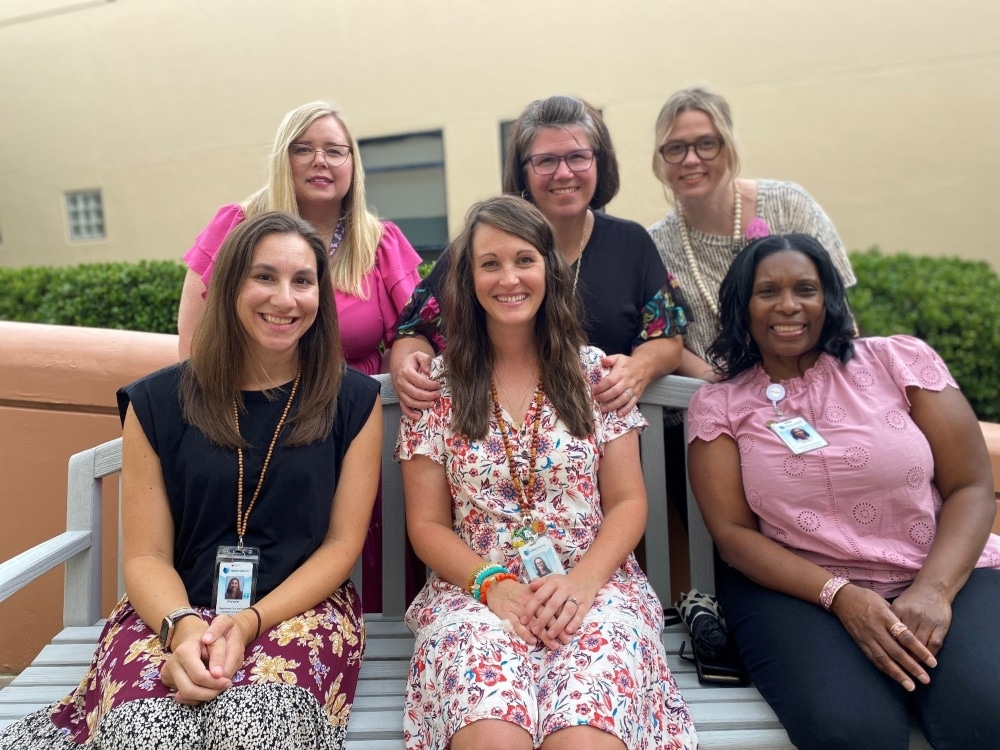
The ECU Health Regional Pediatric Asthma Program, first begun in 1995, initially served Pitt and Greene counties. The pilot program was a partnership between the ECU Health Maynard Children’s Hospital, Community Health programs and a local elementary school. In 1996, the hospital was awarded a three-year grant from the Duke Endowment to further support the development of a comprehensive pediatric asthma program model that focused on children in grades K–5. As a result, they saw a 40% decrease in ED visits by school-aged children, a 50% decrease in student absences and a 50% decrease in inpatient cost of care for school-aged asthmatic children.
The program has since expanded to serve 29 counties in eastern North Carolina, and the number of public schools served has increased to 16.
“Our legal team and the school boards establish contracts with the elementary schools that renew on a rolling basis, and these allow us to do asthma testing, communicate with parents, liaise with the children’s PCPs, help the kids access medication and ensure they are compliant,” said Bailey Edwards, respiratory care manager of the Pediatric Asthma Program. A respiratory therapist who has worked at ECU Health for nine years, Edwards joined the team after working bedside in the NICU and PICU. “I saw so many kids with asthma come through our hospital with severe symptoms.”
In addition to Edwards, the team is comprised of a medical director, a social worker, nurses and three additional RTs. Edwards and the team have worked hard to grow and improve the Pediatric Asthma Program’s scope. Once a child is referred by the school nurse, an asthma care manager contacts the parents for the consent to treat.
“I call the parents and introduce myself, tell them about the program and learn more about their child,” Edwards said. Then, Edwards goes to that child’s school and performs a fractional exhaled nitric oxide (FeNO) test with the child, which determines how much lung inflammation is present and how well inhaled steroids suppress that inflammation.
“Some of these kids have outrageously high FeNOs but didn’t know it – they didn’t realize they couldn’t breathe,” Edwards said. “I call their doctor after my assessment and let them know my findings and recommendations. Then we figure out how to get the child what they need.”
Medications are a key part of the child’s treatment, but often their families cannot afford them.
“We provide medications for free or at low cost through a Children’s Miracle Network Hospitals grant. These medications can keep kids out of the hospital,” Edwards said.
The asthma team also provides education to the children and their parents about how to use the medications properly and potential causes of asthma exacerbations, such as tobacco smoke, dust, weather change or exercise. Once a treatment plan has been established, the asthma team follows up regularly for several months to ensure the child is compliant and the plan is effective.
“A month after initial treatment, I often hear parents say, ‘My kid is my kid again,’ and the child is laughing and playing because they can breathe,” Edwards said.
The program’s reach into public schools continues to grow; nine more schools have pending contracts.
“Our outreach to schools is based on what we see in the emergency departments and hospitals,” Edwards said. “Once we identify these problem areas, we connect with primary care physicians and school nurses to establish relationships.”
Many of those connections are made through lunch and learns the team hosts at regional schools.
“We bring treats and give an hour presentation about our services, update the school nurses on asthma guidelines and tell them how they can refer to us,” she said. Doing this has allowed the program to get many more referrals. “What started as a trickle has now turned into a waterfall.”
Going through the schools, said Sue Anne Pilgreen, manager for the Pediatric Asthma and Eastern Carolina Injury Prevention Programs (ECIPP), is the best way to connect with children in rural areas.
“It is impossible for us to physically be in every county, but our regional partnerships with school nurses and primary care providers gives us a direct pipeline to these children, and they know we are only a phone call or school visit away,” Pilgreen said. “We take a holistic approach in caring for our patients and their families, and sometimes that means helping them find better housing, reliable transportation or mental health resources. Looking at a family’s social determinants of health and helping to fill some of those gaps is a critical piece of caring for children in eastern North Carolina.”
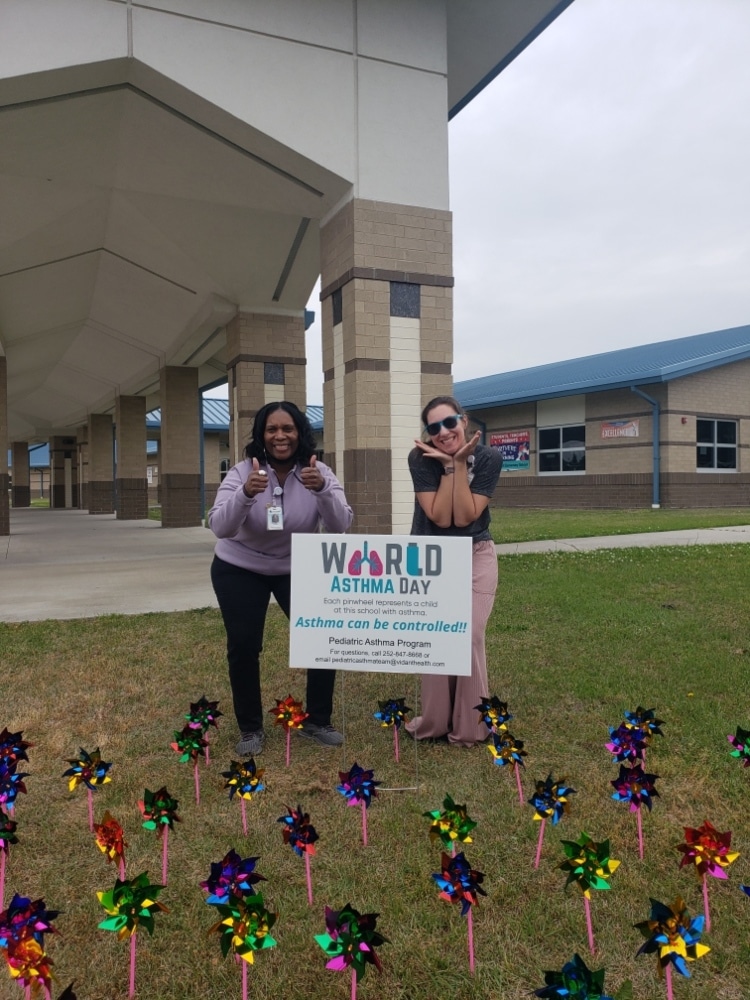
This program aims to overcome the disparity in health care options for many of the children they treat.
“You see families with no food, no electricity and no ability to afford medicine,” Edwards said. “The parents don’t want to take their kids out of school to see the doctor because that child has already missed so much school because of their asthma, and they can’t afford to take the time off work themselves. This program strives to eliminate those barriers.”
While the public school outreach is a major part of the program, it’s not the only way they are treating asthmatic children in rural North Carolina.
“We work with Dr. William Wooten, our medical director, in having monthly pulmonary clinics that provide specialty level care in places that don’t have those resources,” Edwards said. “It started in Jacksonville and moved to Richlands. Now we have three clinics — Richlands Pulmonary Clinic, ECU Tarboro and ECU Edenton — and more locations requesting clinics of their own.”
Like the school outreach, these clinics reduce the burden for families who cannot travel farther away.
“We’re cutting into that lack of transportation or gas money,” Edwards said. “And in places that don’t have clinics, we are gaining more school contracts.”
Looking forward, Edwards said the next goal is to increase their scope of research and apply for more grant money.
“We applied for a Vision Grant, which we should hear about this summer, and we are exploring research options, especially ones that demonstrate the program’s efficacy,” Edwards said.
These efforts will support the program’s continued growth and help them meet new opportunities to better serve eastern North Carolina.
That’s important, Edwards said, because since 2021, they’ve seen a 378% increase in the number of referrals and a 312% increase in the number of cases managed. This program, she emphasized, is unique in that it helps children and their families understand asthma so they can control it and have a high quality of life.
“There’s no program in North Carolina like us, and a lot of people reach out to us about what we’re doing,” Edwards said.
The program is always looking for more effective and efficient ways to reach families, because children with asthma are often invisible to those not looking for specific symptoms.
“You see a kid at school who doesn’t speak above a whisper or doesn’t speak in complete sentences. They don’t run around and play. They look fine, but to someone who is trained, you can tell their asthma isn’t well controlled,” Edwards said. “Asthma can go dormant and then come back; it can silence you. But this program can set you up for the rest of your life.”